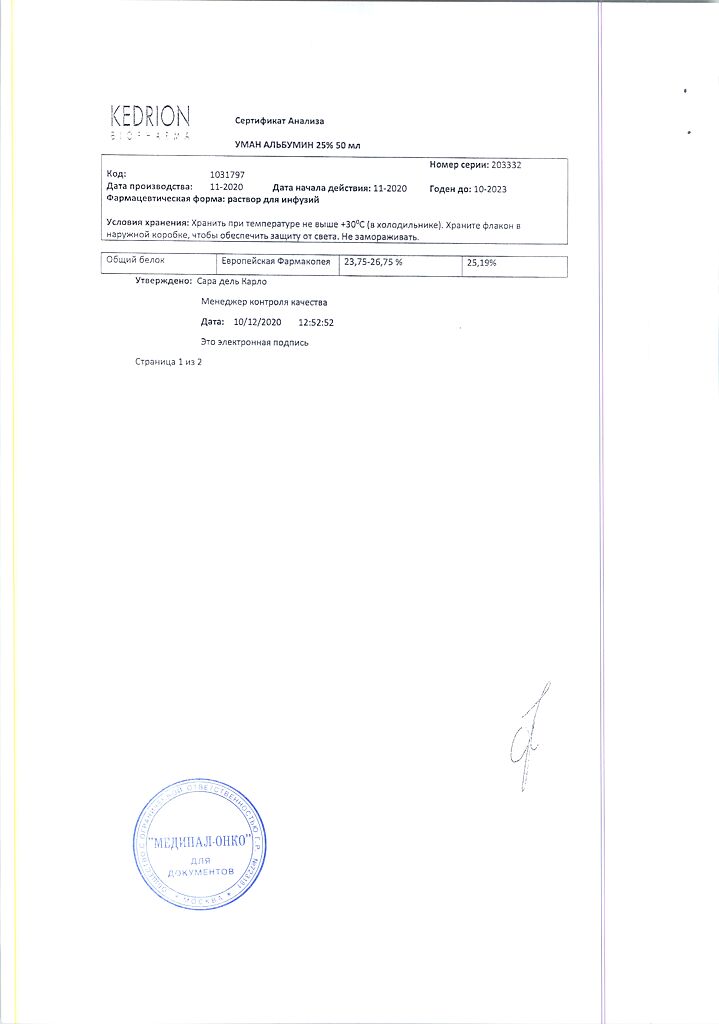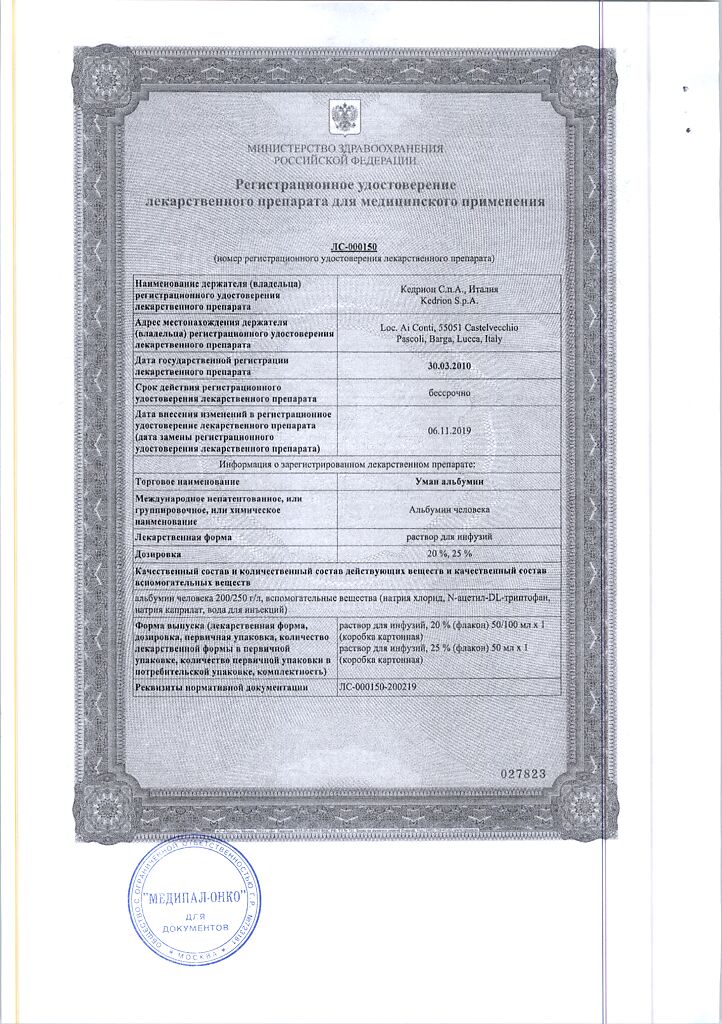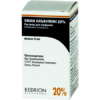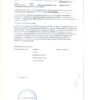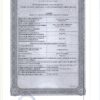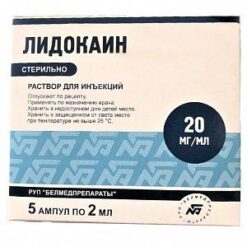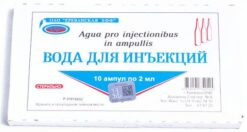No products in the cart.
Uman albumin, 25% 50 ml
€1.00
Out of stock
(E-mail when Stock is available)
EAN: 4607003390686
SKU: 117763
Categories: Anesthesia and resuscitation, Anesthesia solutions, Medicine
Description
Human albumin
Indications
Indications
Restoration and maintenance of circulating blood volume in the event of its deficiency and when it is advisable to use colloidal solutions.
Pharmacological effect
Pharmacological effect
ATX
B05AA01 Albumin
Pharmacological group
Products for enteral and parenteral nutrition
Substitutes for plasma and other blood components
Pharmacokinetics
Normally, the total metabolic fraction of albumin is 4–5 g/kg body weight; of this amount, 40–45% are in the vascular bed, and 55–60% in the extravascular space. In pathological conditions such as severe burns or septic shock, the normal distribution of albumin is disrupted, which is associated with a significant increase in capillary permeability.
The average half-life of albumin is 19 days. Elimination occurs intracellularly with the participation of lysosomal proteases.
In healthy individuals, less than 10% of intravenously administered albumin is cleared from the vascular bed during the first 2 hours after infusion. The effect on plasma volume is subject to significant individual variation. In some patients, plasma volume may remain elevated for several hours. However, in critically ill patients, albumin may be cleared from the vasculature in significant quantities and at an unpredictable rate.
Pharmacodynamics
Human albumin is a natural protein that makes up more than half of the protein fraction of human blood and about 10% of the protein synthesized by the liver.
The most important physiological functions of albumin are its contribution to oncotic pressure and transport functions. Albumin stabilizes the circulating blood volume and is a transport protein that carries hormones, enzymes, drugs and toxins.
Albumin solution 20% and 25% has a hyperoncotic effect.
Pharmacological properties
Uman albumin is a solution for infusion of highly purified and virus-inactivated human albumin obtained by fractionation of human blood plasma tested for viral safety. This drug is used as a plasma replacement agent; it replenishes the deficiency of plasma albumin, maintains colloid-osmotic (oncotic) blood pressure, quickly increases blood pressure and total circulating blood volume (TBV), promotes the transition of fluid from tissue to the bloodstream, and has detoxification properties.
Special instructions
Special instructions
If you suspect an allergic or anaphylactic reaction, you must immediately stop administering the drug. In case of shock, standard anti-shock measures should be taken.
The human albumin preparation is used with caution in cases in which hypervolemia and its consequences or hemodilution may be dangerous for the patient. These conditions include:
– chronic heart failure;
– arterial hypertension;
– varicose veins of the esophagus;
– pulmonary edema;
– hemorrhagic diathesis;
– severe anemia;
– renal and postrenal anuria.
The oncotic effect of a 20% or 25% solution of human albumin is approximately four times higher than that of blood plasma. Therefore, when administering concentrated solutions of human albumin, special care should be taken to ensure adequate hydration of the patient. When administering the drug, it is necessary to carefully monitor the patient’s condition to avoid circulatory overload and overhydration. In an albumin solution with a concentration of 200–250 g/l (20–25% solution), the electrolyte content is correspondingly lower than in albumin solutions with a concentration of 40–50 g/l (4–5% solution). Therefore, when administering human albumin solution, it is necessary to monitor the patient’s electrolyte status and, if necessary, take appropriate measures to restore or maintain electrolyte balance.
In the case of extensive replacement therapy, monitoring of coagulation and hematocrit is necessary. Particular attention should be paid to adequate replacement of other blood components (clotting factors, electrolytes, platelets and red blood cells).
When the hematocrit decreases below 30%, red blood cells must be administered to maintain oxygen transport in the blood.
If the dose and rate of administration of the drug do not correspond to the patient’s circulatory condition, hypervolemia may develop. When the first clinical signs of overload of the cardiovascular system (headache, shortness of breath, swelling of the jugular veins) appear, with increased blood pressure, increased central venous pressure or pulmonary edema, you must immediately stop administering the drug.
Virus safety
The production of drugs from human blood plasma includes a set of measures to prevent the transmission of infectious agents to patients. These measures include careful selection of healthy donors to ensure that individuals at risk are not donated, testing of each donor for viral safety, testing of each unit of blood or plasma and plasma pool for viruses/infections, and viral inactivation and virus removal steps during the manufacturing process.
Despite these precautions, the use of human blood products does not completely eliminate the possibility of transmission of infection, including unknown or recently discovered viruses or other types of infection. When each dose of a human albumin product is administered, it is strongly recommended that the name and batch be recorded to maintain records of the product.
Impact on the ability to drive vehicles and machinery
Does not affect the ability to drive a vehicle, operate machinery or other activities requiring high concentration.
Active ingredient
Active ingredient
Human albumin
Composition
Composition
Active ingredient:
Human albumin
Excipients:
sodium chloride
sodium caprylate
N‑acetyl‑DL‑tryptophan
water for injection
Pregnancy
Pregnancy
The drug human albumin should be prescribed with caution to women during pregnancy and breastfeeding, since controlled clinical studies of the drug have not been conducted in this group of patients. However, experience with the clinical use of human albumin preparations does not give reason to expect any harmful effects on pregnancy, the fetus or the newborn, since human albumin is a normal component of human blood plasma.
The effect of human albumin on fertility has not been studied in controlled clinical trials. To assess the safety of a human albumin preparation in relation to reproductive function, embryonic or fetal development, the course of pregnancy, as well as peri- and postnatal development, the results of experimental studies in animals are insufficient. Before prescribing, the doctor must assess the possible risks and benefits of using human albumin in each specific case.
When prescribing the drug, it is necessary to take into account the replaced plasma volume in a pregnant patient.
Contraindications
Contraindications
Hypersensitivity to any of the components of the drug.
With caution
The human albumin preparation should be used with caution in conditions where hypervolemia and its consequences or hemodilution may pose a particular risk to the patient, in particular, chronic heart failure, arterial hypertension, esophageal varices, pulmonary edema, hemorrhagic diathesis, severe anemia, renal and postrenal anuria.
Side Effects
Side Effects
In rare cases, flushing, urticaria, fever and nausea may occur. These reactions usually disappear quickly when the rate of administration of the drug is reduced or stopped. Very rarely, severe allergic reactions such as shock may occur. In these cases, administration of the drug should be stopped and appropriate treatment should be started immediately.
Interaction
Interaction
Specific interactions of human albumin with other drugs have not been established. Human albumin should not be mixed with other drugs, blood or red blood cells, with the exception of isotonic solutions used to dilute the drug.
Overdose
Overdose
With a high dose or rate of administration of the drug, hypervolemia may develop.
When the first symptoms of overload of the cardiovascular system (shortness of breath, swelling of the jugular veins, headache), increased arterial and/or central venous pressure, and the development of pulmonary edema appear, you should immediately stop administering the drug and establish constant monitoring of circulatory parameters.
In addition, diuresis and cardiac output should increase depending on the severity of the clinical picture.
Storage conditions
Storage conditions
Store in a place protected from light at a temperature not exceeding 30 °C. Do not freeze.
Keep out of the reach of children.
Shelf life
Shelf life
3 years.
Do not use the drug after the expiration date.
Manufacturer
Manufacturer
Kedrion S.p.A., Italy
Additional information
| Manufacturer | Cedrion S.p.A., Italy |
|---|---|
| Medication form | solution for infusion |
| Brand | Cedrion S.p.A. |
Related products
Buy Uman albumin, 25% 50 ml with delivery to USA, UK, Europe and over 120 other countries.


